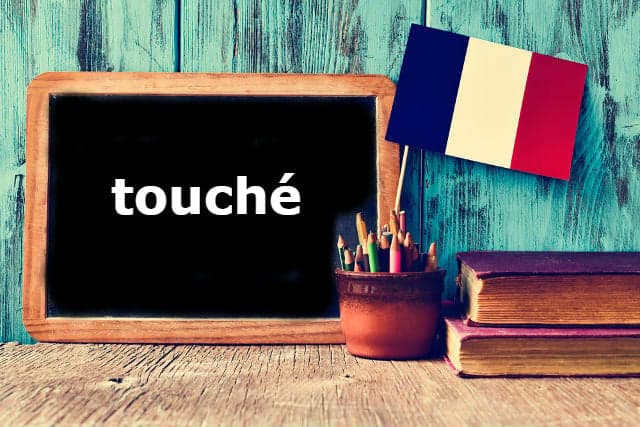French Word of the Day: touché

While you may have heard (or even used) touché while speaking English, you should be aware that French speakers usually use this word a little bit differently...
Why do I need to know touché?
So you know that this word means very different things in English and French.
So, what does it mean?
Touché is the past participle of the word toucher, which means ‘to touch’ as a verb and refers to one of the five senses when used as a noun.
But English speakers use it to acknowledge a particularly effective counter-argument or comeback in a battle of repartee or "banter", as some would say.
In an argument in English, touché is often used to recognize that the other person has made a good, clever or funny point that cannot be refuted or has no comeback.
This use of the word has its roots in the sport of fencing, and signaled that one of the competitors had been struck, or ‘touched’, by the other (much of fencing’s vocabulary comes from French - ‘en garde’ or ‘riposte’, for example).
In fencing as in arguing, it signals that one’s adversary has scored a point.
How do I use touché in French?
In everyday French conversation, it’s unlikely that you’ll hear touché used in this way, unless you’re actually fencing. It does, however, have some figurative meanings besides the obvious physical one that you should be aware of.
For instance, one can use touché to say that something has affected them emotionally, or moved them, similar to the use of ‘touched’ in English, as in :
J’ai été vraiment touché par sa générosité - ‘I was really touched by his/her generosity.’
and...
Votre discours nous a beaucoup touchés - ‘Your speech really moved us.’
or simply...
Ça m’a touché - ‘That had an emotional impact on me’ or 'It really moved me'.
Another common figurative use of the verb toucher occurs when one talks about receiving or winning a certain amount of money.
For example, just as one might ‘hit the jackpot’ in English, they would similarly touche le jackpot in French.
And someone who ‘gets a bonus’ for a certain achievement would touche une prime:
Après avoir vendu sa vingtième, Jacques a touché une grosse prime - ‘After selling his 20th car, Jacques got a big bonus.’
This works with almost any monetary situation, like: toucher une bourse - ‘ to get a scholarship’ - or toucher une indemnité, ‘to receive compensation’ (for damages, injury, etc.).
Je ne touche pas ma bourse jusqu’à janvier, je suis fauché. - ‘I don’t get my scholarship (money) until January, I’m broke.’
Hopefully, you’ll have a chance to use toucher in this sense in the near future...
Comments
See Also
Why do I need to know touché?
So you know that this word means very different things in English and French.
So, what does it mean?
Touché is the past participle of the word toucher, which means ‘to touch’ as a verb and refers to one of the five senses when used as a noun.
But English speakers use it to acknowledge a particularly effective counter-argument or comeback in a battle of repartee or "banter", as some would say.
In an argument in English, touché is often used to recognize that the other person has made a good, clever or funny point that cannot be refuted or has no comeback.
This use of the word has its roots in the sport of fencing, and signaled that one of the competitors had been struck, or ‘touched’, by the other (much of fencing’s vocabulary comes from French - ‘en garde’ or ‘riposte’, for example).
In fencing as in arguing, it signals that one’s adversary has scored a point.
How do I use touché in French?
In everyday French conversation, it’s unlikely that you’ll hear touché used in this way, unless you’re actually fencing. It does, however, have some figurative meanings besides the obvious physical one that you should be aware of.
For instance, one can use touché to say that something has affected them emotionally, or moved them, similar to the use of ‘touched’ in English, as in :
J’ai été vraiment touché par sa générosité - ‘I was really touched by his/her generosity.’
and...
Votre discours nous a beaucoup touchés - ‘Your speech really moved us.’
or simply...
Ça m’a touché - ‘That had an emotional impact on me’ or 'It really moved me'.
Another common figurative use of the verb toucher occurs when one talks about receiving or winning a certain amount of money.
For example, just as one might ‘hit the jackpot’ in English, they would similarly touche le jackpot in French.
And someone who ‘gets a bonus’ for a certain achievement would touche une prime:
Après avoir vendu sa vingtième, Jacques a touché une grosse prime - ‘After selling his 20th car, Jacques got a big bonus.’
This works with almost any monetary situation, like: toucher une bourse - ‘ to get a scholarship’ - or toucher une indemnité, ‘to receive compensation’ (for damages, injury, etc.).
Je ne touche pas ma bourse jusqu’à janvier, je suis fauché. - ‘I don’t get my scholarship (money) until January, I’m broke.’
Hopefully, you’ll have a chance to use toucher in this sense in the near future...
Join the conversation in our comments section below. Share your own views and experience and if you have a question or suggestion for our journalists then email us at [email protected].
Please keep comments civil, constructive and on topic – and make sure to read our terms of use before getting involved.
Please log in here to leave a comment.